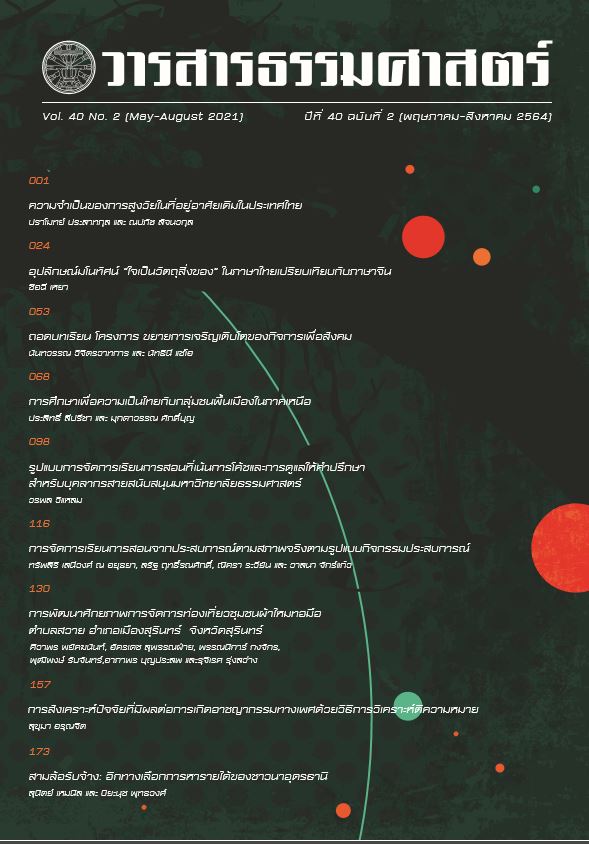Authentic Experiential Learning
Main Article Content
Abstract
Experienced-based teaching is a student-centered teaching method which the teacher believes that the students can learn from their own experiences in which the teacher is the only person who facilitates the learners' learning and self-understanding process. There are 5 stages of the method: presentation and exchange of experiences, discussion stage, summary of allusion, and application stage. This process will empower students to understand the content and can be applied to both oneself, family, and others.
Article Details
References
Honey, B. P., Mumford, A., & Kolb, D. A. (1984). Experiential learning: Experience as the source of learning and development. Englewood Cliffs, NJ: Prentice Hall.
Honey, P. & Mumford, A. (2000). The learning styles helper's guide. Maidenhead: Peter Honey Publications Ltd.
Honey, P. , & Mumford, A. (1992) . The manual of learning styles (2nd ed.). Maidenhead, UK:
Kolb, A. Y., & Kolb, D. A. (2006). Learning styles and learning spaces: A review of The multidisciplinary application of experiential learning theory in higher education. In R. R. Sims, & S. J. Sims (Eds.), Learning styles and learning: A key to meeting the accountability demands in education (pp. 45–92). New York: Nova Science Publishers.
Kolb, D. A., Rubin, I. M. , & Osliand, J. (1991). Organization behavior reader. Englewood Cliffs, NJ: Practice-Hall Skinner, B. F. (1974). About Behaviorism. New York,
Mezirow, J., Taylor, E. W. (2009). Transformative Learning in Practice ; Insights from Community, Workplace, and Higher Education. San Francisco, CA; J
กระทรวงศึกษาธิการ. (2544). หลักสูตรการศึกษาขั้นพื้นฐาน พุทธศักราช 2544. กรุงเทพมหานคร: พัฒนาคุณภาพวิชาการ.
ชวลิต โพธิ์นคร. (2560). การศึกษาไทยมายุคไทยแลนด์ 4.0. การประชุมใหญ่สามัญประจำปี 2559 และประชุมวิชาการเรื่อง”ห้องสมุดดิจิทัลกับการก้าวสู่ยุค Thailand 4.0”. สืบค้น 23 มีนาคม 2560, จากhttp://km.li.mahidol.ac.th/thai-studies-in-thailand-4-0
ดิเรก วรรณเศียร. (2558). MACRO MODEL: รูปแบบการจัดการเรียนรู้สำหรับศตวรรษที่ 21. มหาวิทยาลัยราชภัฎสวนดุสิต.
นุชนาฎ ยูฮันเงาะ และทัศนีย์ นิลสูงเนิน. (2561). การเรียนการสอนจากประสบการณ์ โดยบูรณาการมิติเพศภาวะและความเป็นธรรมทางสังคม ในรายวิชา SW3003 เพศภาวะและ ความรุนแรงในครอบครัวและ SW3223 สังคมสงเคราะห์ผู้ถูกทารุณกรรมทางเพศ. คณะสังคมสงเคราะห์ศาสตร์และสวัสดิการสังคม มหาวิทยาลัยศรีนครินทรวิโรฒ: กรุงเทพ.
วิจารณ์ พานิช. (2558). เรียนรู้สู่การเปลี่ยนแปลง Transformative Learning. พิมพ์ครั้งที่ 1. กรุงเทพฯ.
สำนักงานคณะกรรมการการศึกษาขั้นพื้นฐาน. (2556). เอกสารรายงานการวิจัยเรื่อง การจัดทำยุทธศาสตร์การปฏิรูปการศึกษาขั้นพื้นฐานให้เกิดความรับผิดชอบ. กระทรวงศึกษาธิการ
อารี พันธ์มณี. (2546). จิตวิทยาสร้างสรรค์การเรียนการสอน. กรุงเทพฯ: ใยไหม.

